Structure of import of services in 2021 (graphically)
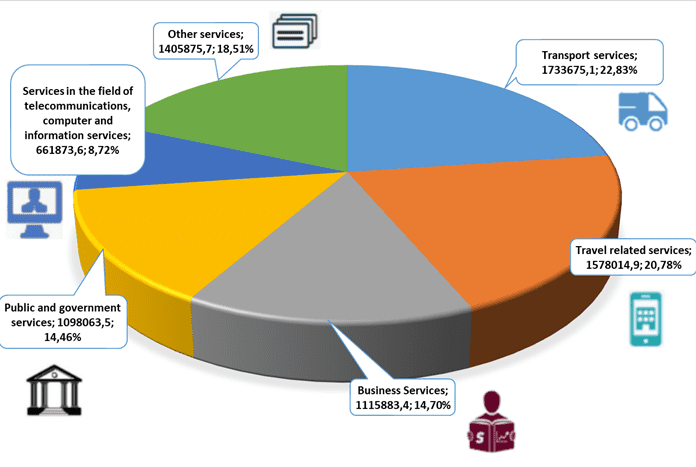
SSC of Ukraine
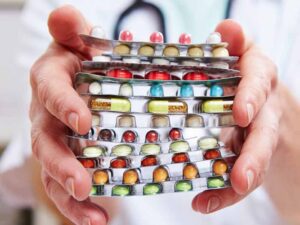
The Verkhovna Rada has registered a draft law restricting the circulation of medicines produced in the Russian Federation or the Republic of Belarus.
Relevant bill No. 7313 of April 25, 2022, authored by a group of MPs of the Servant of the People faction, including head of the Committee on Public Health, Medical Assistance and Medical Insurance Mykhailo Radutsky, was registered in the Verkhovna Rada.
As reported, according to First Deputy Minister of Health Oleksandr Komarida, state registration in Ukraine of medicines (all or selectively determined by the Ministry of Health) of an applicant may be temporarily canceled (registration certificate terminated) if it is established that this applicant or his representative is directly or indirectly related to with business entities that are directly or indirectly involved in production of medicines on the territory of the aggressor state (the Russian Federation or the Republic of Belarus).
In addition, the registration of a drug may be canceled if, after February 23, 2022, the applicant participated in at least one of the stages of production of any medicinal product or active pharmaceutical ingredients by an enterprise located on the territory of the aggressor state.
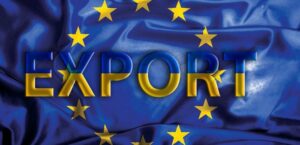
The European Commission (EC) has proposed to suspend for one year the collection of import duties on all Ukrainian exports to the European Union, the EC communiqué said on Wednesday.
“I discussed with President Zelensky ways to support the economy, in addition to the macro-financial assistance and grants that we provide. We both agree on the critical importance of a quick and wide suspension of import duties to boost the economy of Ukraine,” European Commission President Ursula von der Leyen was quoted in the message.
According to her, the suspension of duties “will greatly facilitate the export of Ukrainian industrial and agricultural goods to the EU.” She promised continued economic assistance to Kyiv.
The EC proposal also provides for the suspension for one year of all EU anti-dumping and safeguard measures in force against Ukrainian steel exports. This move, explained in Brussels, is designed to help increase Ukraine’s exports to the EU, which will alleviate the plight of Ukrainian producers and exporters in the current situation in the country.
“The EU has never before taken such trade liberalization measures, which are unprecedented in their scope: giving Ukraine access to the EU market with zero tariffs, zero quotas,” said Valdis Dombrovskis, Executive Vice President of the European Commission.
The European Commission points out that in the difficult conditions of the situation in Ukraine, the European Union wants to do everything possible to help the country “maintain its trade positions with the rest of the world and further deepen its trade relations with the EU.”
Brussels also reports that the EU is taking measures to facilitate land transport of goods to help export Ukrainian products outside the country. Thus, the European Commission has already begun liberalizing the conditions for Ukrainian truck drivers transporting goods between Ukraine and the EU, as well as actions to facilitate transit and use the EU infrastructure to direct Ukrainian exports to third countries.

A group of people’s deputies propose to the Parliament to refuse exemption from import duties, excise tax and VAT on car imports, bill No. 7311, the text of which is posted on the website of the Verkhovna Rada, testifies. the budget received less than 350 million hryvnia, and now the daily amount of benefits is 100 million hryvnia.
At the same time, not isolated cases of the importation of premium cars were recorded, the authors of the bill note, among them is the head of the Verkhovna Rada Committee on Finance, Tax and Customs Policy Daniil Getmantsev.
The bill also proposes to return taxation for goods imported by single tax payers of the first or third group.
The authors of the bill point out that during the week of such relaxations, the budget received less than UAH 417 million.
As reported, on March 24, 2022, the Verkhovna Rada of Ukraine, in order to stimulate important imports for the country, among a number of goods for the period of martial law, exempted the import of vehicles by citizens from taxation (cars, motorcycles, trucks and buses).
According to the State Customs Service, over the month, Ukrainians have issued more than 19,000 cars on preferential terms, which created problems and delays for the import of humanitarian aid.
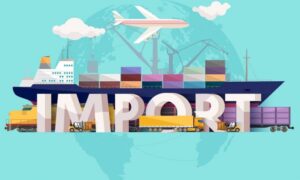
The situation with the import of goods after the abolition of VAT and duties discredits Ukraine in front of neighboring partner countries and indicates abuses when importing goods under the guise of “humanitarian aid”, therefore, amendments to the regulatory framework will be proposed in the near future, Deputy Minister of Infrastructure said Mustafa Nayem.
“I think that in the near future, my colleagues from the Ministry of Finance and the Customs Service will propose to the Cabinet of Ministers appropriate changes to the regulatory framework in order to correct this situation without harming real volunteers,” he wrote on Facebook. Nayem noted that 14.3 thousand cars were imported into the country in eight days after the abolition of customs duties. “Our partners in Poland, Slovakia and Romania are a little surprised by such an active renewal of the vehicle fleet of a warring country for which the whole world is raising funds for humanitarian assistance. For example, they are shocked by the industrial scale of imports” for the needs of the Armed Forces of Ukraine “luxury cars,” the deputy minister said..
According to him, there are dozens of BMW X5, Mercedes-Benz S-Class, 2022 Audi Q7 and even Cadillac Escalade for UAH 3.1 million among them. Nayyem added that over the same period, “humanitarian aid” was imported into the country completely legally, without any customs payments, in the form of various fabrics – for UAH 360 million, mobile phones for almost UAH 200 million, and so on.
“Unfortunately, this is how some of our fellow citizens interpreted the government’s initiative to help volunteers and the army,” the Deputy Minister of Infrastructure stated.
As reported earlier, the head of the profile committee of the Verkhovna Rada, Danil Getmantsev, said about the need to revise the introduced preferential regime for imports.
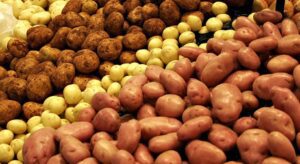
Record Agro LLC (Kyiv), the official distributor of the German breeding company Europlant, has resumed deliveries of high reproduction potato seeds from Germany to Ukraine, which were forced to stop with the start of the Russian military invasion.
On Tuesday, the website of the profile Ukrainian Association of Potato Producers (UAPC) reported on the import of the first batch of 22 tons of seed potatoes of the Bellarosa, Sanibel, Jeli, Vineta varieties.
“Potato seeds are categorized by the government as critical imports. There are no problems with its supplies. There are no queues at the border and customs,” Yuriy Dyak, director of Record Agro, is quoted in the message.
At the same time, it is specified that Ukrainian farms with the status of elite farms – certified seed enterprises – became the customers of the delivered batch. They will lay seed plantations in Ukraine for the 2023 harvest.
“We will be able to meet the needs of all elite farms in a very short time,” Dyak confirmed.
According to Record-Agro, at the moment the company is the only official importer of potato seeds in Ukraine, while the work of other seed farms is hampered by the military invasion of the aggressor country of the Russian Federation. The importer specified that Ukrainian farms are now growing seed potatoes from high reproductions purchased from European breeding companies in 2021.
As reported, by April 8, Ukraine had sown 1.07 million hectares of land with the main agricultural crops, which is 7.9% of the 13.44 million hectares planned for the current season, including 0.47 million ha. At the same time, 43.2 thousand hectares were sown with potatoes on the indicated date.